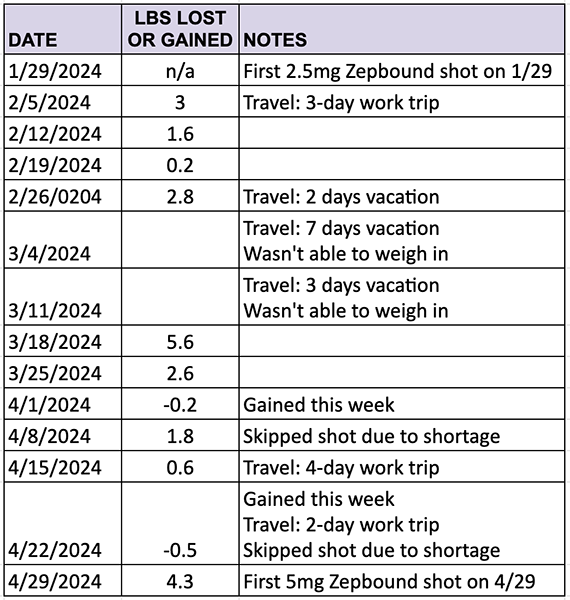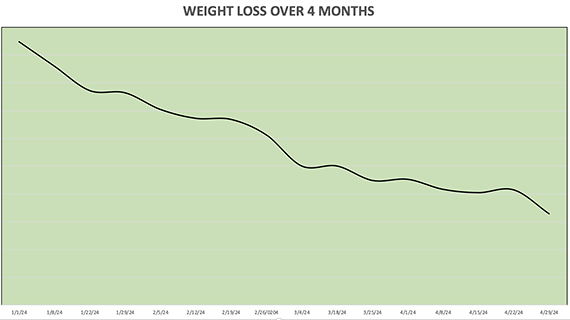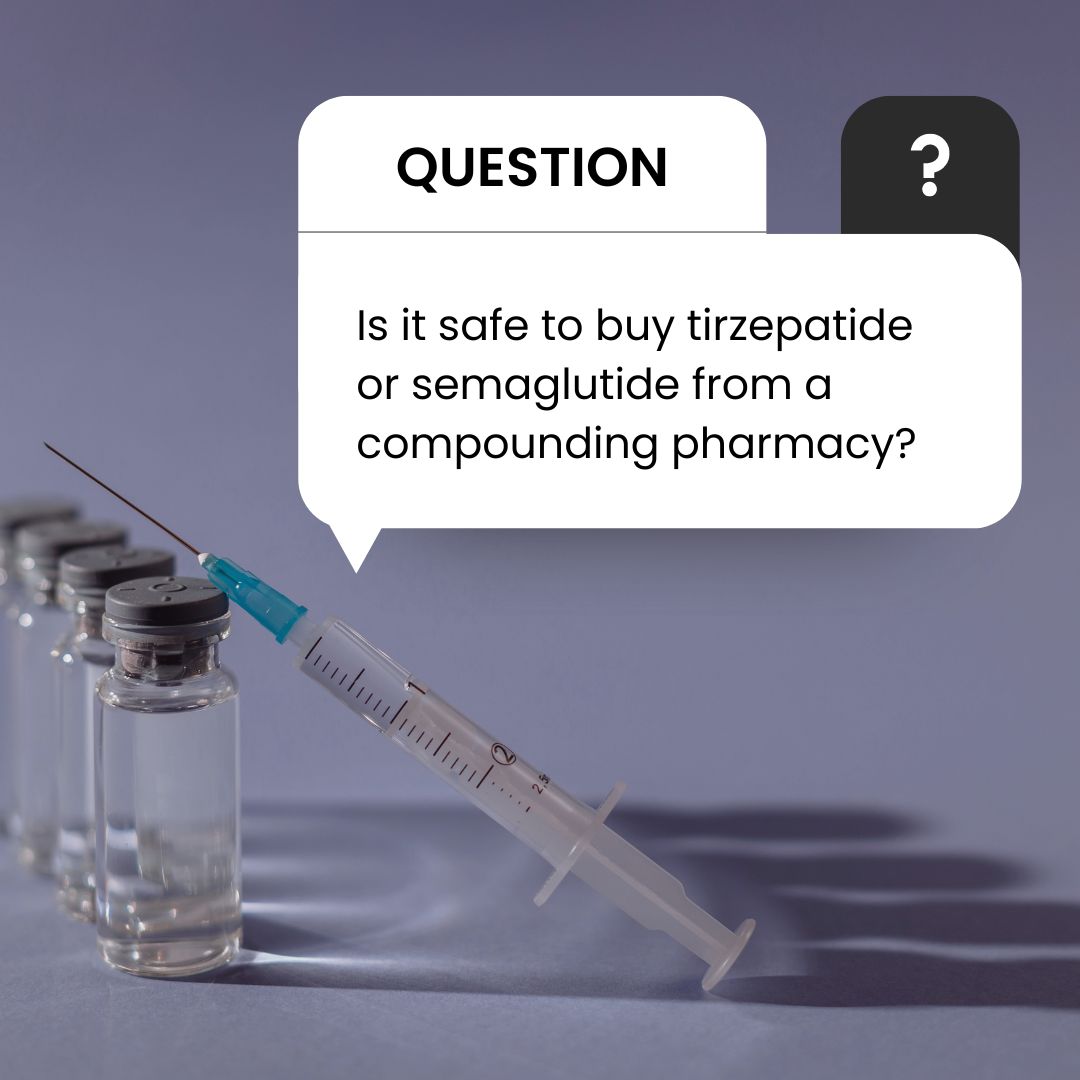How much can I lose on Zepbound?
How much can I lose on Zepbound? I get this question all the time.
In this post, I’ll talk about how much I’ve lost in the first four months of my journey. But first, let me share the clinical data to give you some perspective on how much weight others have lost using tirzepatide (Zepbound or Mounjaro).
Eli Lilly, developer of tirzepatide, ran a 72-week study of adults without diabetes. The group’s average starting weight was 231 pounds.
Here’s the average weight loss at different Zepbound dosages.
| AVERAGE WEIGHT LOSS (72 WEEKS) | ZEPBOUND DOSAGE |
| 15% (34 pounds) | 5mg |
| 19.5% (44 pounds) | 10mg |
| 20.9% (48 pounds) | 15mg |
| 3.1% (7 pounds) | Placebo (no Zepbound) |
How many pounds I’ve lost on Zepbound so far
On January 1, 2024, I embarked on my most recent weight loss journey. This attempt might be the one that “sticks.” Metabolic issues have plagued me for decades and I’ve cycled up and down the scale but could never stay at my goal weight. Zepbound, the GLP-1 injection drug my endocrinologist recommended for me, seems to finally be helping me.
Anyone who has tried to lose weight before knows that the process isn’t linear. You may eat the exact number of calories recommended per day, drink all the water and do all the exercise and the results might not be what you expect.
When I share my stats below, you’ll notice a trend of weight loss. I didn’t lose every single week and that’s OK. I even gained a bit of weight on certain weeks. That’s why when you begin this process, you need to promise yourself that you’ll be Zen about it. There will be weeks where the scale doesn’t budge… or — sigh — goes up. Trust the process, stay the course and your metabolism will catch up and finally release those pounds.
Month 1, before Zepbound: Lost 9.2 pounds
I didn’t start Zepbound on Jan. 1, 2024, but I did begin warming up my body for what was to come. This entailed drinking more water, with the goal of at least 96 ounces daily, and adding more exercise. I was already eating the right calorie count per day. However, my carbohydrate-to-protein ratio wasn’t balanced (too many carbs). I began to correct that in my meal plan.
‘Water weight’ loss
I lost 9.2 pounds during this preparatory period. I believe much of that was “water weight.” According to Medical News Today, we retain water when our sodium intake is too high, when we ingest more carbs than we need and when we don’t drink enough water. By adjusting a few of these factors, my body decided to release some weight.
I went to my primary care doctor in mid-January and when it was clear I’d need a weight loss specialist, I signed up for Weight Watchers Clinic powered by Sequence. I started taking Zepbound on Jan. 29, 2024.
Months 2–4, on Zepbound 2.5mg: Lost 22 pounds
In consultation with my doctor, I decided to stay on 2.5mg for 12 weeks. This was the right decision for me, even though I had to pay out of pocket since my insurance limits certain dosages of Zepbound (2.5mg, 7.5mg, and 12.5mg).
Many people take 2.5mg for the first four weeks and then titrate up to 5mg and stay there until the weight loss slows or food noise returns to an untenable level.
Here’s how my week-to-week weight changes looked.

Looking at this chart, it’s easy to see that I lost weight most weeks but not all. I gained a half-pound or less in two out of 12 weeks while I stayed nearly the same weight for one week out of this three-month stint. I was traveling on two weigh-in days, so I wasn’t able to capture data for those weeks. Otherwise, I lost from 0.6 to 4.3 pounds week-over-week.
I had some outlier weeks, too. While March 18 indicates I lost 5.6 pounds, that’s over a three-week period in which I was traveling and not able to weigh in. So that’s not a true week-over-week representation of my weight loss.
Weight loss isn’t linear
Losing a half-pound to a pound per week is considered a safe rate of loss. I could have been upset during the weeks that I gained or stayed close to the same weight. But, I had prepped myself for this inevitability. Losing weight isn’t a straight line but one that’s very squiggly.

How long it’s going to take to lose all the weight
I know how difficult it is to take the long view but the sooner you adopt that attitude, the easier this journey will be. For me, I likely won’t hit my maintenance phase for several years. I can’t afford to get sidetracked by the desire for instant gratification. It’s not going to happen.
Related: How to set your goal weight
If I were to set my goal weight solely according to my Body Mass Index (BMI), it would be between 101.1 to 136.1 pounds. Frankly, I don’t think those numbers are realistic for me. Umm. I probably haven’t been 100 pounds since I was seven years old! LOL! When I’m ready to set a goal weight, my doctor and I will probably select a higher number.
For example’s sake though, let’s say I want to lose 130 pounds. A safe rate of loss is a half-pound to one pound per week. Say things are going great and I average a loss of one pound a week. This process will still take me 2.4 YEARS.
The wrap-up
It took years to gain the weight and it will take years to lose it. You have to be OK with that idea.
In the past, you probably never said, “Darn! I only gained one pound this week” so why are you chiding yourself for only losing a pound this week? Don’t do that! One pound a week is amazing! Rock star status! Focus on your everyday triumphs and don’t get bogged down with the end goal. Slow and steady will get you to your goal.
Email me to let me know how your GLP-1 weight loss is going. What’s working for you and what isn’t? Or, post your questions to the Shots to Shed Pounds Facebook page.






